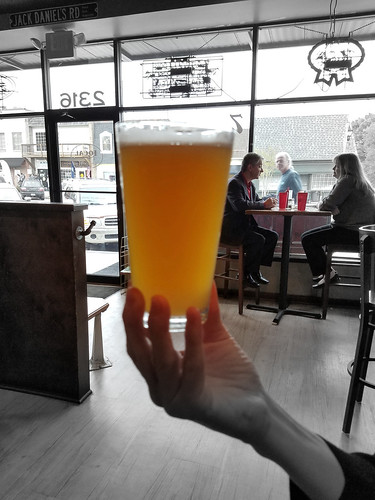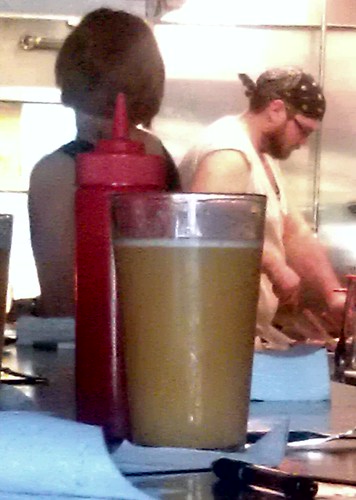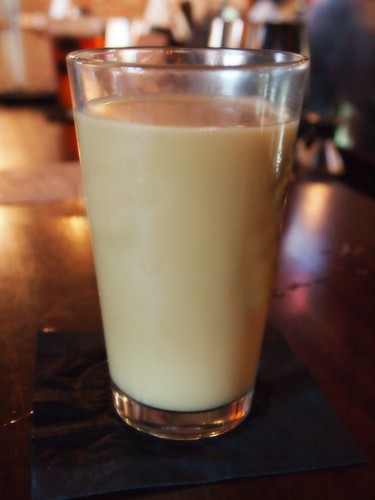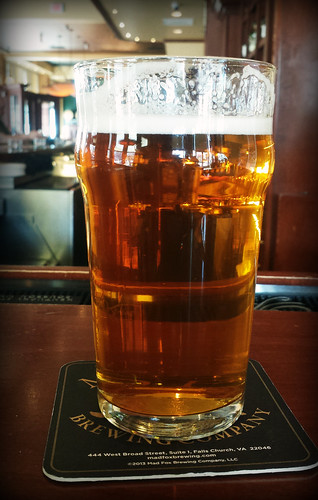I'm superficial. I'll immediately stipulate to that. I notice beauty before I look for substance. The beer above was a pleasant enough IPA, but remind me again: why must 'craft' beer appear ugly to taste good?
When I taste a beer, I use all of my senses. First, I see the beer. I look at it and admire it (or not). Muck? Uck! Then I sniff it, then I sip, and only then do I drink it down, luxuriating in the after-effect of the whole exercise.
The photo above may not do justice to the turbidity of the beer held, 'photoshopped' as it was. So, here's another beer from another day, unretouched, that I took surreptitiously by phone-camera. This glass of mud had been unabashedly presented by brewery and pub:
And, yes, I taste a beer using the sense of hearing. As the late, great Fred Eckhardt would counsel: "Listen to your beer!" The sound of a bottle cap popping off a bottle, the crack of CO2 as a beer can is pierced, the gurgle as a beer is poured into a glass: these are all cues and pleasures.
When I was but a zymurgical pup, I was trained by a brewer to operate a DE filter. He taught me to pour a sample from the post-filtration valve and taste it for organoleptics —tasting for quality control. Beer, which only minutes before, unfiltered, had been brumous and dun, now was beautifully bright and briskly refreshing. He called this magical thing, "the happy valve." We would 'quality control' a number of times. Happy, indeed.
In 1979, Fritz Maytag moved his dilapidated Anchor Brewing to beautiful new digs. Afterward, he appealed to the intrinsic grace of beer: "Don't tell me that good beer can be made in an ugly brewery." Likewise, now, in 2016, don't tell me that my beer must be turbid to be flavorful, unseemly to be ineffable. Hell, no!
There was a time, not too long ago, that good beer drinkers and 'craft' brewers would demean the macro-breweries for shortening the lagering times of their beers —the weeks, if not months, required for natural clarification and conditioning. Now, criss-cross, many 'craft'-ers consider a deliberate lack of patience to be a badge of honor, and clarity to be disparaged. I gag at beers that appear, forgive me, as baby puke. A slight haziness or wispy cloudiness is one thing, but deliberate avoidance of beautiful brewing seems to be 'craft' beer's unfortunate newest thing.
"Haze" describes inherent dullness that pervades the whole liquid, and can be caused by diverse materials, including yeast and other microorganisms, protein, polyphenols [such as tannins], starch, β-glucan, pentosan [large sugar molecules], and oxalate [e.g., calcium oxalate]. [...]— The Oxford Companion to Beer: Oxford University Press, 2012.
Chill haze occurs when a beer is chilled below approximately 1.6 ºC (about 35 ºF), and will usually develop into a permanent condition over time. The major components of these aggregates are certain classes of proteins and polyphenols that are derived from brewing raw materials, namely malt and hops.[...] Colloidal haze is generally the result of protein molecules within the beer joining with polyphenols to form molecules large enough to cause turbidity. [...] Hazes caused by dry hopping are also colloidal hazes and are caused by polyphenols [tannins] from the hops combining with protein [from the malt], oxygen, or heavy metals.
Proper and skillful brewing — with or without fining agents, with or without filtration— can and will produce exquisitely limpid beers. That's known as Stokes' Law —gravity's gift— and zymurgy —brewing science and know-how.
I stand firmly in this position —saying yes to beauty— if accompanied by a shrinking minority of like-thinking brewers and drinkers, so-called London Murky and New England-style Murky IPAs notwithstanding.
I ask, why drink this...
...when you could drink this?
We few, we happy few, we band of sisters and brothers, we'll raise the windows, stick our heads out, and we'll say it loud and proud (and encourage more to join in, as anthem):
"Just say no to ugly beer!"
-----more-----
- Pic(k) of the Week: one in a weekly series of personal photos, usually posted on Saturdays, and often, but not always, with a good fermentable as the subject. Camera: Olympus Pen E-PL1.
- Commercial reproduction requires explicit permission, as per Creative Commons.
- For more from YFGF:
- Follow on Twitter: @Cizauskas.
- Like on Facebook: YoursForGoodFermentables.
- Follow on Flickr: Cizauskas.
- Follow on Instagram: @tcizauskas.







Is that penultimate picture really a picture of beer and not just a yeast sample from the fermenter?
ReplyDeleteI wouldn't even serve my homebrew in that state, and yet people honestly expect consumers to fork out cash for such slop?
A real thing! http://www.yoursforgoodfermentables.com/2013/06/cask-pour-you-must-be-joking.html
Delete